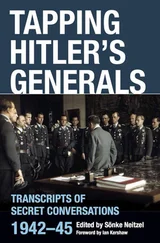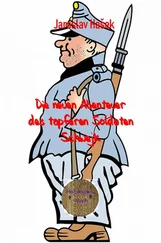One fact needs to be acknowledged. Whatever they may encounter, human beings are never unbiased. Instead, they perceive everything through specific filters. Every culture, historical epoch, or economic system—in short every form of existence—influences the patterns of perception and interpretation and thus steers how individuals perceive and interpret experiences and events. The surveillance protocols reflect, in real time, how German soldiers saw and commonly understood World War II. We will show that their observations and conversations are not what we would usually imagine—in part because they, unlike we today, did not know how the war would end and what would become of the Third Reich and its Führer. The soldiers’ future, both real and imaginary, is our past, but for them it was an unfinished book. Most of the soldiers are scarcely interested in ideology, politics, world orders, and anything of that nature. They wage war not out of conviction, but because they are soldiers, and fighting is their job.
Many of them are anti-Semites, but that is not identical with being “Nazis.” Nor does anti-Semitism have anything to do with willingness to kill. A substantial number of the soldiers hate “the Jews” but are shocked at the mass executions by firing squads. Some are clear “anti-Nazis” but support the anti-Jewish policies of Hitler’s regime. Quite a few are scandalized at hundreds of thousands of Russian POWs being allowed to starve to death, but do not hesitate to shoot POWs themselves if it seems too time-consuming or dangerous to guard or transport them. Some complain that Germans are too “humane” and then tell in the same breath and in great detail how they mowed down entire villages. Many conversations feature a lot of boasting and chest-puffing, but this goes well beyond today’s males’ bragging about themselves or their cars. Soldiers frequently seek to rack up points with tales of extreme violence, of the women they raped, the planes they shot down, or the merchant ships they sank. On occasion, we were able to determine that such stories were untrue and intended to make an impression, even by relating, for instance, how they sank a ship that was transporting children. That is beyond the pale today, but the parameters of what could be and was said then were different from what obtains today, as are the things which they hoped would elicit admiration and respect. Acts of violence, back then, belonged to that category. Most of the soldiers’ stories may initially seem contradictory, but only if we assume that people act in accordance with their “attitudes,” and that those attitudes are closely connected with ideologies, theories, and grand convictions.
In reality, people act as they think is expected of them. Such perceived expectations have a lot less to do with abstract “views of the world” than with concrete places, purposes, and functions—and above all with the groups of which individual people are a part.
To understand and explain why German soldiers waged war for five years with a ferocity still unparalleled today, causing an eruption of violence that claimed 50 million lives and decimated an entire continent, we have to see the war, their war, through their eyes. The following chapters will be concerned in detail with the factors that influenced and determined the soldiers’ perspective, their frames of reference. Readers who are not interested in Nazi and military frames of reference and are more curious about the soldiers’ narratives and discussions about violence, technology, extermination, women, or the Führer should proceed directly to this page. After we have given a detailed account of the soldiers’ views on fighting, killing, and dying, we will compare war as waged by the Wehrmacht with other wars, thereby elucidating what was specifically “National Socialist” about World War II. This much we can reveal in advance: the results of this examination will often be unexpected.
SEEING THE WAR WITH SOLDIERS’ EYES: ANALYZING FRAMES OF REFERENCE
Human beings are not Pavlovian dogs. They don’t react with conditioned reflexes to predetermined stimuli. Between stimulus and reaction, something highly specialized happens which epitomizes human consciousness and which distinguishes our species from all other forms of life. Humans interpret what they perceive and on the basis of interpretation draw conclusions, make up their minds, and decide what to do. Belying Marxist theory, human beings never act on the basis of objective conditions; nor do they act, as disciples of rational choice theory long wanted us to believe, solely with an eye toward cost-benefit calculations. Waging war is neither the only logical result of cost-benefit analysis nor a necessary consequence of objective circumstances. A physical body will always fall according to the laws of gravity and never otherwise, but whatever human beings do they could always have done differently. Nor do magic entities such as “mentalities” make people behave a certain way, although psychological structures no doubt influence what human beings do. Mentalities precede but do not determine decisions. Even if people’s perceptions and actions are bound up with social, cultural, hierarchical, and biological or anthropological circumstances, human beings always enjoy a certain freedom of interpretation and action. But the ability to interpret and decide presupposes orientation and knowledge of what one is dealing with and what consequences a decision can have. And a frame of reference is what provides orientation.
Frames of reference vary drastically according to historical periods and cultures. Orthodox Muslims, for instance, categorize suitable and unsuitable sexual behavior within a completely different framework from that of secular inhabitants of Western society. Nonetheless, no member of either group is able to interpret what he sees outside references not of his own choice or making. They influence, guide, and even steer his perceptions and interpretations. That is not to say that transgressions of a preexisting frame of reference do not occur in special situations. It is possible to observe or think something new. But this is relatively seldom the case. Frames of reference guarantee economy of action so that most of what happens can be sorted within a familiar matrix. That makes things easier. People called upon to act don’t need to start from the very beginning with the question: what is actually going on here? In the vast majority of cases, the answers to this question are preprogrammed and accessible, saved in a corpus of cultural orientation and knowledge. Most everyday tasks are taken care of by routines, habits, and certainties, and that saves individual human beings a colossal amount of work.
Thus when we want to explain human behavior, we first must reconstruct the frame of reference in which given human beings operated, including which factors structured their perception and suggested certain conclusions. Merely analyzing objective circumstances is inadequate. Nor do mentalities explain why someone did a specific thing, especially in cases where members of a group whose minds were all formed the same way arrive at entirely different conclusions and decisions. This is the systemic limit upon theories about ideological wars and totalitarian regimes. The question always remains: how are “world views” and “ideologies” translated into individual perceptions and interpretations and how do they affect individual behavior? In order to understand those things, we analyze frames of reference as a way of reconstructing the perceptions and interpretations of people in specific historical situations, here German soldiers during World War II.
When frames of reference are ignored, academic analyses of past actions automatically become normative, since present-day standards are enlisted to allow us to understand what was going on. As a result, past wars and violence often appear bafflingly “horrible,” even though horror is a moral and not an analytical concept. Moreover, the behavior of people who exercise violence appears abnormal and psychopathic, despite the fact that when we reconstruct the world from their perspective their rationale for using violence is entirely logical and understandable. Analyzing frames of reference allows us to view the violence of World War II in nonmoral, nonnormative fashion. The aim is to understand the preconditions for psychologically normal people to do things they would not otherwise do.
Читать дальше












